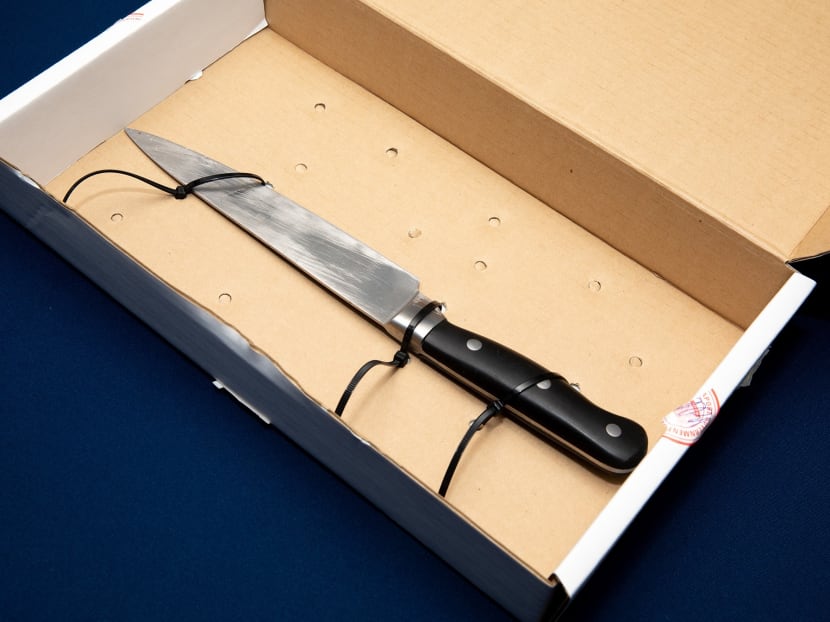Number of knife-related crimes over last 5 years remained 'relatively constant', a third occurred in residential areas: Desmond Tan
SINGAPORE — The number of knife-related crimes involving murder, robbery, rioting and serious hurt has remained "relatively constant" over the past five years, averaging about 150 cases annually, said Minister of State for Home Affairs Desmond Tan on Monday (April 4).

The knife that was used by a knife-wielding man during an incident along Bendemeer Road on March 23, 2022. The number of knife-related crimes has remained "relatively constant" over the past five years, averaging about 150 cases annually, said Mr Desmond Tan on Monday (April 4).
SINGAPORE — The number of knife-related crimes involving murder, robbery, rioting and serious hurt has remained "relatively constant" over the past five years, averaging about 150 cases annually, said Minister of State for Home Affairs Desmond Tan on Monday (April 4).
About 36 per cent of these crimes occurred in residential areas, and 3 per cent took place in educational institutions' premises. The remaining cases occurred in other public and commercial places, said Mr Tan in Parliament.
He was responding to parliamentary questions in light of recent sword and knife-related crimes.
In March, a 64-year-old man armed with a knife died after he was shot in the chest by the police. He had refused to drop his weapon despite multiple warnings and was tasered three times.
Last month, a 37-year-old man was charged after he was seen wielding a sword at Buangkok Crescent, swinging it at a pedestrian and hitting passing cars.
In the same month, a 27-year-old man was charged with throwing a "watermelon knife" at a police officer in Bukit Batok.
For urgent incidents, including those involving dangerous weapons, the police are generally able to respond within 15 minutes of the call, said Mr Tan.
“The officers will use force, wherever necessary. This includes situations which require them to protect and save lives, including their own lives, and prevent the commission of an offence, and arrest subjects,” he added.
“Where a person refuses to comply with police’s instructions and poses a threat to the lives of those around him, including the police officers, the officers may use lethal force to neutralise the threat.”
Where firearms have been used, the police psychological services department works with the unit’s leadership and para-counsellors to provide “stress management interventions” to support the officers involved.
MHA currently regulates six items under the Arms and Explosives Act – swords, spears, spearheads, daggers, bayonets and dangerous bows and arrows, said Mr Tan.
Items like knuckledusters and flick knives will be included in the list when the Guns, Explosives and Weapons Control Act replaces the Arms and Explosives Act later this year, he noted.
“Regulated items will be subject to greater control, including the regulation of sales on e-commerce platforms,” Mr Tan said.
“We need to be calibrated on the regulatory measures to be imposed. Many items with common daily usage, like knives, can also be used as offensive weapons. We need to be practical and not overregulate such items.”
There are also legislative measures to deal with people with a higher propensity of committing crimes, including knife-related crimes, due to “certain psychiatric conditions”, Mr Tan noted.
For example, a person who suffers from a mental disorder can be detained under the Mental Health (Care and Treatment) Act. Where a person has already been convicted of an offence, the court may impose a Mandatory Treatment Order if their psychiatric condition contributed to the offence, he added.
The order will compel the person to undergo psychiatric treatment for up to 36 months in lieu of imprisonment.
“For those who are incarcerated, the Singapore Prison Service provides intervention for inmates who are at risk of violent reoffending. For example, they are taught how to regulate their emotions and acquire skills to resolve conflicts without resorting to violence,” said Mr Tan.
MHA and its partner agencies have engaged the public through the SGSecure movement, he added. This includes emergency preparedness programmes such first aid and the use of cardiopulmonary resuscitation and automated external defibrillators.
“These skills are also applicable in non-terrorism related emergencies, such as the recent knife incidents, and will help members of the public avoid or reduce harm to oneself and others," said Mr Tan.
In response to a supplementary question about police presence in areas, Mr Tan said mobile self-help stations have been deployed to "more secluded" areas. People can activate the police at these locations using the stations. CNA
For more reports like this, visit cna.asia.






